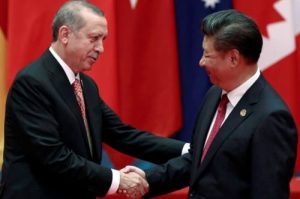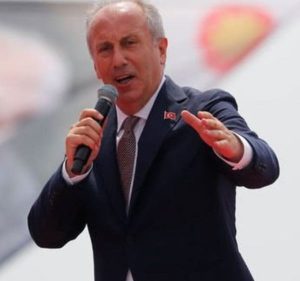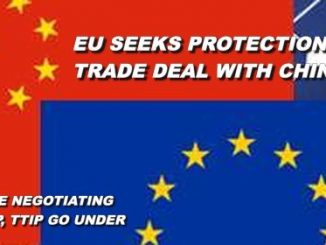
This is How Erdogan’s Re-Election Will Effect Turkey’s International Partners and Rivals
ADAM GARRIE
The successful re-election of Turkish President Erdogan and the accompanying victory of the his parliamentary People’s Alliance means that, internally, Turkey will continue on a similar economic and social trajectory as it as been since Erdogan’s AK party rose to prominence in the early 2000s. But while the AK Party’s model of rapid economic growth, civic regeneration and investment into education has remained largely consistent since Erdogan first entered national government as Prime Minister in 2003, Turkey’s foreign policy continues to grow, shift and pivot in new multipolar directions under Erdogan’s leadership.
Here’s what Erdogan and his alliance’s victory means for major international players.
Russia
Under President Erdogan, Russo-Turkish relations have reached their most positive levels since the age of Lenin and Ataturk in the 1920s. While after the First World War, both Lenin and Ataturk came to embrace one another as two revolutionaries leading two very different kinds of revolutions, the  current close professional and personal friendship between Erdogan and Putin has much more turbulent origins.
current close professional and personal friendship between Erdogan and Putin has much more turbulent origins.
In November of 2015, Turkey shot down a Russian Su-24 fighter jet flying near Turkey’s border with Syria. Matters were already tense between the two countries because, at that time, Turkey and Russia were pursuing a diametrically different course of action in the Syria conflict.
The downing of the Su-24 which resulted in the death of one of the two pilots led Russia and Turkey to downgrade their relations and suspend most most forms of trade and bilateral tourism. At the time it was conventional wisdom that Turkish forces downed the jets based on an order from the top.
It later emerged that those responsible for the downing of the jet were aligned with the Fethullah Terror Organisation (FETO). This led to a profound shift in thinking in both Moscow and Ankara as it became clear that FETO sought to undermine the stability of both nations and had a keen interest in stalling Russo-Turkish reconciliation. In spite of FETO’s lethal provocations, in June of 2016 Presidents Putin and Erdogan began a reconciliation process which continued to advance rapidly.
In July of 2016 – a month after Russia and Turkey began mending ties, FETO and its western backers staged a coup attempt against Erdogan’s government. It is widely believed that Russian intelligence tipped Erdogan off about the coup attempt moments before the agitators began their provocation, thus allowing him to move to a secure location from where he rallied the nation against the terrorists using a live video app on his phone.
The coup was ultimately a failure and only served to strengthen Russo-Turkish ties. Tragically however, a FETO member assassinated Russia’s Ambassador to Turkey in December of  2016. Ambassador Andrey Karlov had played a crucial role in helping Russia and Turkey to normalise relations in the aftermath of the Su-24 downing and he paid the ultimate price at the hands of the same terror group whose military assets downed the Russian fighter jet a year before. This tragic incident only served to strength the resolve of Erdogan and Putin to form a closer and meaningful partnership.
2016. Ambassador Andrey Karlov had played a crucial role in helping Russia and Turkey to normalise relations in the aftermath of the Su-24 downing and he paid the ultimate price at the hands of the same terror group whose military assets downed the Russian fighter jet a year before. This tragic incident only served to strength the resolve of Erdogan and Putin to form a closer and meaningful partnership.
Today, Russia and Turkey have not only fully reconciled but are working together in many key areas. Both sides have increased bilateral trade and intended to increase it ever more throughout 2018 and into 2019. Russia and Turkey along with Iran continue to cooperate in the Astana format which is geared towards reaching a peaceful settlement to the conflict in Syria, while key energy projects such as the Turk Stream 2 pipeline and Turkey’s first ever nuclear power plant which is being built by Russia are further examples of high level cooperation between two partner nations. Finally, Turkey intends to take delivery of Russia’s S-400 missile defence systems in spite of pressure from the US to dump the deal.
Under Erdogan, Russo-Turkish relations look to continue along this positive line, something that could not be said for Erdogan’s main rival in the Presidential elections, the pro-EU Muharrem Ince.
China
In 2013, then Prime Minister Erdogan was among the first major world leaders to embrace Chinese President Xi Jinping’s One Belt–One Road global trading and logistics initiative. Since then, Turkey has worked consistently to expand trade with China while the country remains an important part of the ever expanding One Belt–One Road network.
 Ankara has also worked to crack down on media provocations from Sinophobic “journalists” in Turkey who seek to stir unnecessary tensions in China’s Xinjiang province. In 2017, Erdogan’s government formally restricted Sinophobic materials from the country’s media outlets while boosting bilateral security initiatives between the two nations.
Ankara has also worked to crack down on media provocations from Sinophobic “journalists” in Turkey who seek to stir unnecessary tensions in China’s Xinjiang province. In 2017, Erdogan’s government formally restricted Sinophobic materials from the country’s media outlets while boosting bilateral security initiatives between the two nations.
As Erdogan has promised to take a firm line against western currency speculators and even named George Soros as an enemy during a pre-election campaign speech, it is clear that when it comes to injections of fresh capital, China will become a more valuable and reliable partner to Turkey vis-a-vis European finance houses and those from the United States.
For Turkey to successfully combat the likes of Soros, who waged a speculation war against the Lira prior to the election, the best defence against western financial and monetary meddling is the good offence of weening Turkish trade off of US Dollar transactions, all the while working on new partnerships with financial institutions from China and other Asian nations, including Russia. Turkey’s destiny as an independent power is at stake. When western financial institutions declare war, one must respond with vigour.
It is clear that post-election already healthy ties between Ankara and Beijing will continue to grow
Iran
Turkey’s relationship with Iran in recent decades has often been prone to various fluctuations but in recent years, Presidents Erdogan and Rouhani have worked to not only stabilise relations but to expand them. Turkey and Iran have boosted bilateral trade in the Erdogan era while Iran has supported Turkey’s building of a frontier rampart between the two countries designed to cut off the Iran based PJAK terror group from supplying its sister terror organisation PKK across the border.
 While Turkey and Iran continue to have open disagreements on policies regarding Syria, both nations have worked together in the Astana format along with Russia to secure de-escalation zones in the country while also working to foster dialogue between Syrian factions in the hope of creating a lasting peaceful settlement to the conflict.
While Turkey and Iran continue to have open disagreements on policies regarding Syria, both nations have worked together in the Astana format along with Russia to secure de-escalation zones in the country while also working to foster dialogue between Syrian factions in the hope of creating a lasting peaceful settlement to the conflict.
President Erdogan also strongly defended Iran when Donald Trump unilaterally withdrew the US from the JCPOA (the 2015 Iran nuclear deal). While the EU looks as though it’s on the verge of capitulating in the face of US pressure to effectively let the JCPOA die, because of Turkey’s diverse international partnerships and its neighbourly relations with Iran, Ankara is well placed to enhance its economic partnerships with Iran in a post-JCPOA environment.
Syria
Furthermore, as Turkey is now working closely with Russia and Iran in the Astana format – the only realistic format for Syrian peace, the very Astana partnership itself  could have been put it jeopardy by an Ince victory. This could have set back the already fragile peace process which would ultimately be bad for both Syria and her traditional partners.
could have been put it jeopardy by an Ince victory. This could have set back the already fragile peace process which would ultimately be bad for both Syria and her traditional partners.
Finally, until 2011, Syria-Turkey relations had reached their zenith under Erdogan and AK rule in the early 2000s. The seemingly counter-intuitive reasons why an Erdogan victory is actually better for Syria in the long term than an Ince victory would have been, were discussed at length in a piece which can be read here.
Central Asia and Azerbaijan
With the exception of Tajikistan, the central Asian republics are ethnically Turkic as is Azerbaijan in the south Caucasus. Under Erdogan, Turkey has decided to work with rather than against Russia in harnessing both the post-Soviet characteristics of Central Asia and Azerbaijan and the Turkic characteristics of these regions in an effort to enhance multipolar trade and security ties in a strategically important part of Eurasia.
This cooperation could in turn lead to Turkey developing a free trading agreement with the Russian led Eurasian Economic Union which already covers much of central Asia and is set to expand in the near future. Iran has already signed a provisional free trade agreement with the Eurasian Economic Union, which bodes well for neighbouring Turkey also signing a similar agreement. Furthermore, as Turkey is also a dialogue partner with the Shanghai Cooperation Organisation, Erdogan’s eastward and southward looking geopolitics bode well for the prospects of Turkey’s future membership in the world’s largest collective security partnership of equals.
Sudan
In many of the Muslim majority states of Africa, Erdogan has already attained heroic status for being a leader widely seen as a defender of pan-Islamic interests and one who isn’t specifically tied to any Cold War holdover ideology. Nowhere is this more true than in Sudan, where Turkey is becoming a major partner in infrastructural development. Sudanese President Omar al-Bashir was among the first world leaders to personally offer his congratulations to President Erdogan upon his election victory. With both Erdogan and al-Bashir looking to continue their partnership, projects like the Turkish rebuilding of the old Ottoman Sudanese Red Sea Port at Suakin will likely be the beginning of many important collaborative projects to come for the north-east African state that is simultaneously re-intensifying ties with both China and Russia.
Pakistan
Turkey continues to maintain historically good ties with Pakistan, but while this hasn’t changed, Pakistan’s own international alignment has. Under Donald Trump, the US has scandalously  accused Pakistan of harbouring terrorism while both Russia and China have defended Islamabad’s record. With Pakistan facing its own major elections in a month’s time, Turkey can help Pakistan develop a new role as a multipolar nation that rejects US geopolitical bullying while also embracing non-aggression in wider global conflicts.
accused Pakistan of harbouring terrorism while both Russia and China have defended Islamabad’s record. With Pakistan facing its own major elections in a month’s time, Turkey can help Pakistan develop a new role as a multipolar nation that rejects US geopolitical bullying while also embracing non-aggression in wider global conflicts.
Of all the major Pakistani party leaders contending in the forthcoming general election, PTI leader Imran Khan (pictured) is in many ways the most similar to Erdogan in the sense that he has embraced populist measures for economic development, geopolitical neutrality and modern Islamic characteristics as major drivers of policy. With Imran Khan’s popularity rising in spite of multiple rhetorical assaults from his opponents, it would behove the PTI to learn from the successful record of Erdogan’s AK party in what looks to be the most important Pakistani election in decades.
The Balkans
Turkey’s modern role in the Balkans continues to be misconstrued by many observers who base their analysis of Turkey’s role in the southern European region on history rather than on present day trends. Today, Serbia and Turkey are not enemies but partners looking to expand their multipolar economic ties while also looking to fight terrorism that is a mutual threat to both states.
FETO has set up operations in both Albania and the occupied Serbian province of Kosovo and Metohija and because of the reticence of both the regime in Tirana and the one in Pristina to cooperate with Ankara in respect of terrorist extraditions, Serbia has found itself in a unique position, working with Turkey to bring stability to a notoriously fraught region.
Likewise, Turkey’s warm relations with the Bosnian leadership are not a symptom of aggression but rather an attempt to use a positive Turkish influence in the region to counter US attempts at infiltrating Muslim areas of the Balkans with anti-Turkish terror groups like FETO.
Under Erdogan, these respectful partnerships will likely continue and intensify.
The European Union
President Erdogan has always stated that he seeks good relations with the EU but that he nevertheless expects to be treated like an equal. This has proved difficult thanks to multiple anti-Turkish provocations by EU leaders. In Germany, the Merkel government has done little to curtail the spread of PKK aligned terrorism which, in 2018, saw the burning of Turkish mosques and shops throughout the central European country. Likewise, Germany and The Netherlands banned political rallies from Turkish politicians in recent years even though another non-EU leader, Barack Obama, was given preferential treatment when he held campaign rallies in Europe.
The rising Turkophobia in Europe that Erdogan has often compared to Nazism is something that Ankara will not stand for. Erdogan remains willing to work with European partners but only if Europe revises its petulant anti-Turkish attitude. While Ince wanted to surrender Turkish institutions to Brussels, under Erdogan Turkey will expect a European partnership based on respect rather than racism and provocations.
Palestine
Under Erdogan, Turkey has taken a more active role in promoting justice for Palestine than under previous leaders in modern Turkish history. Erdogan’s own image as a global leader of Muslim social and political thought has been widely shaped by his refusal to remain silent on Palestine during an era when even many Arab leaders appear tongue-tied.
With the Palestinian leadership looking for multilateral solutions to their many crises, Turkey clearly has an important role to play along with other regional and international partners in the quest for Palestinian peace and justice. Under Erdogan, this role will likely expand. Palestine’s President Abbas was notably one of the first to congratulate Erdogan on his electoral success.
The United States
At present, the US and Turkey have multiple disputes ranging form the US support of FETO, America’s refusal to extradite the FETO leader to Turkey where he is wanted on terrorism charges, lingering US threats to further delay the physical delivery of F-35 jets to Turkish soil and America’s close alliance with the Syrian branch of the PKK terror group, the YPG.
While Turkey and the US have reached an agreement to free the Syrian city of Manbij from YPG/PKK terrorist occupation, it remains to be seen just how far the US will eventually go in distancing itself from the PKK in Syria. Likewise, the US continues to under-estimate Turkish anger over Washington’s ties with FETO.
While Turkey-US relations would have likely improved under Erdogan’s western leaning rival Ince, Erdogan looks to pursue geopolitical multipolarity whether the US likes it or not.
Conclusion
Erdogan’s election victory was ultimately a victory for multipolarity over insularity and for Eurasianism over Europeanism. Erdogan will welcome partnerships throughout the world, but it is becoming increasingly clear that Turkey’s most important partners in the 21st century are in Asia and Africa rather than in Europe or North America.
************
Original article
ER recommends other articles by EurasiaFuture
Featured image source




